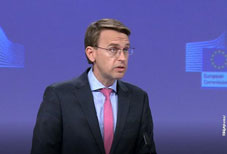
EU Directive vs. Georgian Draft Law and EU Concerns over 'Agents Law'
By Liza Mchedlidze
Tuesday, April 23, 2024
In response to a question posed by Fact-Meter regarding the differences between the draft directive in the European Union and the reintroduced draft law by Georgian Dream, particularly in terms of their scope or overall approach, Peter Stano, spokesperson for the European Union's foreign service, stated that the EU directive draft differs significantly from the Georgian one. Stano emphasized that foreign funding organizations are not the target of the EU directive.
"The draft directive of the European Commission "On the transparency of activities representing the interests of third countries" differs significantly from the Georgian law.
The directive we introduced was initiated to support efforts against foreign interference and disinformation. It focuses exclusively on entities that carry out activities representing the interests of third countries (such as lobbyists) and primarily aims to harmonize the approach between EU member states in order to ensure common transparency standards in the EU.
The directive does not target entities that receive foreign funding, nor does it specifically mention civil society or the media.
In addition, the Directive contains strong safeguards to ensure that measures are proportionate, do not discriminate or stigmatize any actor, and do not in any way restrict the exercise of important fundamental rights, such as freedom of expression or association.
The draft also includes clearly defined supervisory prerogatives of independent national institutions and the right to effective judicial review," Stano stated.
During a press conference in Luxembourg following the Foreign Affairs Council meeting, the EU High Representative for Foreign Affairs and Security Policy, Josep Borrell, stated that the 'Agents law' recently adopted by the Georgian Parliament in its first reading is incompatible with European Union values.
Borrell highlighted the situation in Georgia as a key topic of discussion at the council, noting concerns expressed by foreign ministers of EU member states regarding the Russian law. Additionally, Borrell emphasized that the Georgian government failed to fulfill its obligation when it reintroduced the so-called Russian law, which had been withdrawn one year prior.
Josep Borrell stated, "Last week, EU Commissioner Varhei and I published a statement in which we emphasized that this law is incompatible with the values of the European Union. I repeat, this law is incompatible with the values of the European Union." He added that the European Commission must submit an annual report, expressing concern that the "Russian law" has returned to the parliament.
Rikard Jozwiak, editor of RFE Europe Bureau, mentioned that during the Council of Foreign Affairs, there was a proposal made to either send ministers to Georgia or invite the Georgian Minister of Foreign Affairs to the next Council of Foreign Affairs of the European Union.
"The situation in Georgia was brought up today among EU foreign ministers. there was a call to send ministers to Georgia for a visit or the Georgian foreign ministers to come to Brussels for an upcoming EU foreign affairs council," Jozwiak wrote.

